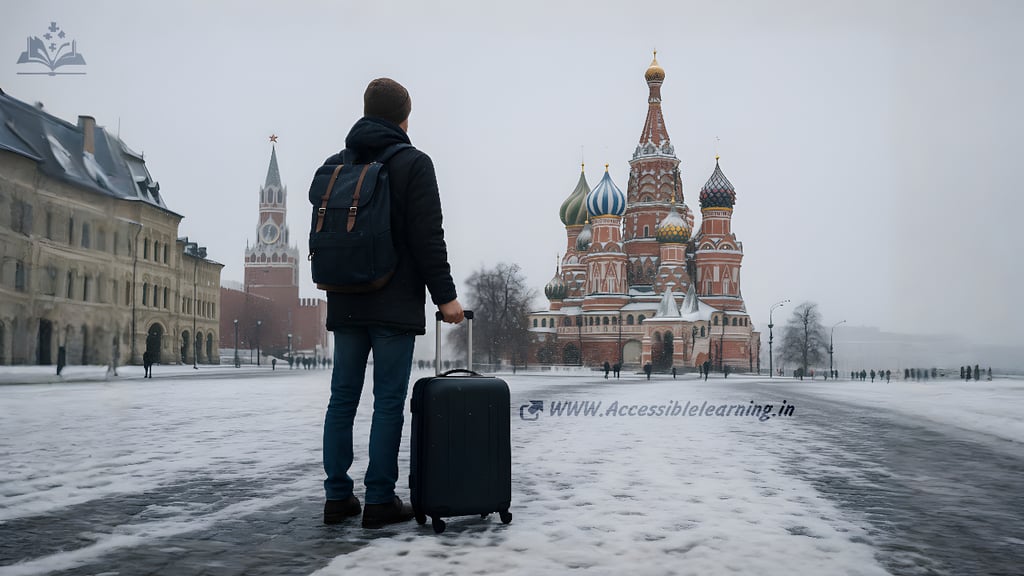
Living Permanently in Russia: A Foreigner’s 12-Year Journey
Discover the real challenges and experiences of living permanently in Russia as a foreigner. From language barriers and government rules to cultural traditions, climate, and social acceptance, this article explores what life feels like after 12 years among Russian people.
RUSSIAEDUCATION/KNOWLEDGENEPOTISM/SOCIAL ISSUESTRAVEL LIFE
Keshav Jha / Kim Shin
10/9/20254 min read


Russia, the largest country in the world, is a land of contrasts—ancient traditions blending with modern life, vast snowy landscapes meeting buzzing cities like Moscow and St. Petersburg. For a foreigner who dreams of making Russia their permanent home, the journey is not easy. Over 12 years, one must overcome language barriers, survive harsh winters, understand government systems, and learn to blend with Russian society. This article explores the challenges and transformations that come with living long-term in Russia as a foreigner.
First Steps: The Initial Culture Shock
When a foreigner first arrives in Russia, they often feel a sense of distance from the people. Russians don’t smile at strangers on the street, which may feel cold at first. However, this is not rudeness—it is simply a cultural difference. Russians value sincerity, and smiles are reserved for genuine emotions.
In the first few years, foreigners may also feel lost in Russia’s complex urban systems, from navigating the metro to handling official documents. Adapting requires patience and resilience.
Language: The Key to Survival
The Russian language is both beautiful and extremely challenging for outsiders. Unlike countries where English is commonly spoken, Russia expects foreigners to learn Russian for almost everything—shopping, banking, healthcare, education, and government paperwork.
Years 1–3: Struggles with basic words and phrases.
Years 4–6: Functional communication develops, but mistakes are common.
Years 7–12: The foreigner becomes fluent enough to work, build friendships, and truly integrate into society.
Without Russian, life remains isolated. With it, doors open to deeper connections and professional growth.
Government Rules and Bureaucracy
One of the biggest challenges is dealing with Russia’s strict bureaucracy. Living permanently requires following a step-by-step process:
Temporary Residence Permit (TRP): The first legal stage for staying long-term.
Permanent Residence Permit (PRP): Granted after years of living under TRP.
Citizenship: A possibility after 5–10 years, depending on background, work, and government approval.
During these years, the foreigner must handle constant paperwork, registration requirements, and inspections. Mistakes or delays can cause major problems.
Russian Culture and Traditions
Over time, a foreigner learns that Russian culture is deeply tied to history and family values.
Hospitality: Once trust is built, Russians invite guests into their homes, offering tea, bread, and endless conversation.
Festivals: New Year’s Eve, Orthodox Christmas, Maslenitsa (pancake festival), and Victory Day are celebrated with passion and pride.
Family Bonding: Respect for elders and strong family unity is central to Russian life.
At first, foreigners may feel like outsiders during these traditions, but after years of participation, they become part of the rhythm of Russian society.
Surviving Russia’s Harsh Climate
For many foreigners, the weather is the toughest challenge. Winters are long and brutal, with temperatures dropping below -30°C in Siberia. The first years feel unbearable, but eventually, one learns:
To wear layered clothing and heavy fur coats.
To appreciate heated apartments and saunas (banya).
To enjoy winter traditions like ice skating, snow festivals, and hot tea gatherings.
By year 12, winter is no longer an enemy—it becomes part of life.
Russian People’s Thoughts About Foreigners
How Russians view foreigners depends on location.
In Moscow and St. Petersburg: People are more open-minded, used to seeing expats, and more willing to accept cultural differences.
In small towns: Foreigners may face suspicion, curiosity, or even prejudice.
Russians respect foreigners who respect Russia—those who follow laws, speak the language, and show appreciation for culture. After 12 years, many foreigners find that they have earned respect and genuine friendships, even if they are never fully considered “Russian.”
Work, Housing, and Daily Life
Finding long-term work in Russia as a foreigner is not always easy.
Common jobs for expats: Teaching English, IT, oil & gas, engineering, and international business.
Housing: Renting is common in the early years, but prices in Moscow and St. Petersburg can be high. Smaller cities are more affordable.
Lifestyle: Public transport is efficient, healthcare is accessible but often bureaucratic, and food is relatively cheap if one eats local products.
After 12 years, the foreigner usually builds a stable routine, balancing work, social life, and Russian traditions.
Life After 12 Years in Russia
By the twelfth year, the foreigner is no longer a stranger. They have adapted to the climate, gained friendships, learned the language, and participated in cultural life. However, they also understand that Russia is not always easy—bureaucracy, politics, and cultural differences remain challenges.
Yet, the 12-year journey teaches them resilience, patience, and appreciation for the uniqueness of Russia. Living in Russia is not about becoming Russian but about building respect, harmony, and balance between two identities.
Interesting Facts
Russia covers 11 time zones and is larger than Pluto.
The Moscow Metro is one of the most beautiful in the world, decorated like palaces.
Russians consume more tea than coffee, often served with jam or sweets.
Victory Day (May 9) is one of the most emotional and important national holidays.
FAQs
Q. How long does it take to get Russian permanent residency?
Usually 5 years, after which one can apply for citizenship depending on conditions.
Q. Do Russians accept foreigners easily?
Acceptance depends on respect, behavior, and language. In big cities, yes; in rural areas, it takes more time.
Q. What’s the hardest part of living in Russia long-term?
The bureaucracy, language barrier, and harsh winters.
Q. Can foreigners buy property in Russia?
Yes, but certain regions (like border areas) are restricted.
Q. Is Russia affordable for expats?
Yes, if living outside major cities. Moscow and St. Petersburg can be expensive.
Subscribe To Our Newsletter
All © Copyright reserved by Accessible-Learning Hub
| Terms & Conditions
Knowledge is power. Learn with Us. 📚


